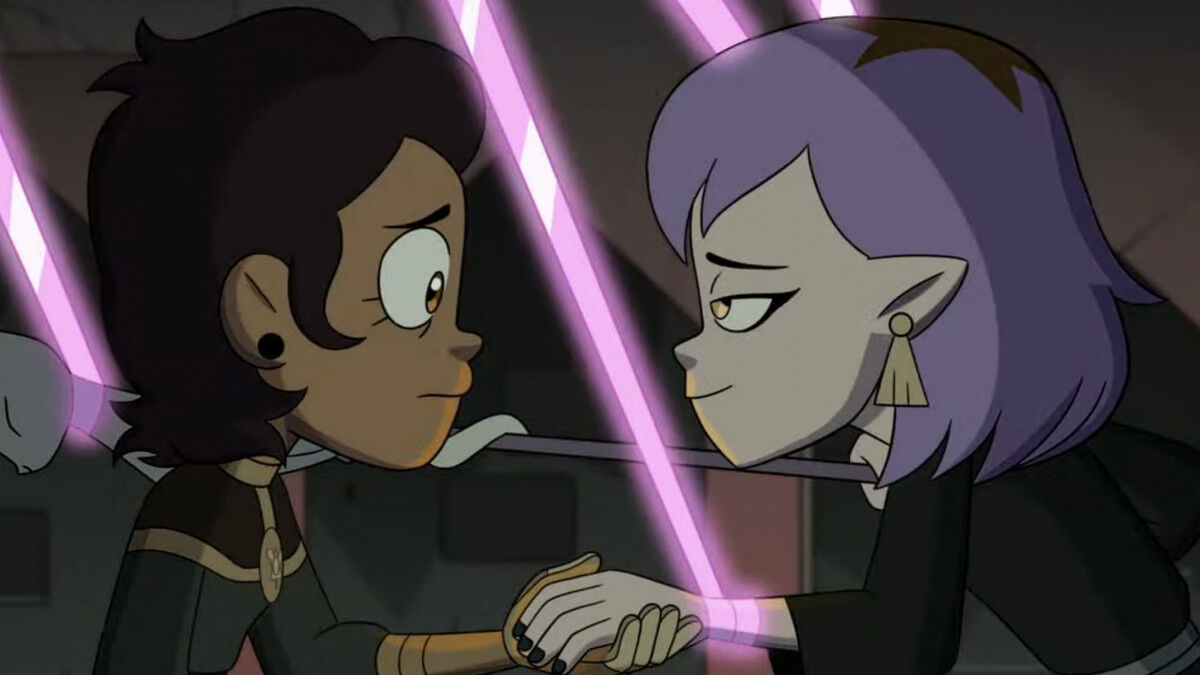This past Saturday, LGBTQ+-inclusive animated cartoon series The Owl House aired its final episode on Disney+. The series was canceled by the streamer after only three seasons, but despite the premature end, The Owl House went out with the grace and heart that had come to define it.
The Owl House premiered in early 2020, and from the very beginning, The Owl House was all about embracing outsiders. The story follows Luz, a human girl who is often ridiculed for her love of fantasy. One day she is transported to the Demon Realm, where she finds acceptance in a ragtag group of witches and demons. She becomes a witch’s apprentice and joins the fight to save her new home, the Boiling Isles, from its evil ruler.
While many shows package LGBTQ+ themes under the generalized idea of “misfits,” The Owl House brought queer characters to the forefront. Luz became Disney’s first bisexual protagonist when she fell for her one-time rival, Amity. This led to the first same-sex kiss and later the first nonbinary character in a Disney series.
Related:
What Does Queer Gen Z Want on TV? Everything Under the Rainbow
INTO asked Gen Zers how they want to see their lives portrayed. And regardless of the genre, authenticity reigns supreme.
There were many more major and minor queer characters beyond these milestone “firsts,” including a pair of gay dads, genderqueer witches and demons, an asexual/aromantic character, among many others. In 2021, The Owl House won the GLAAD Award for Outstanding Kids and Family Programming and a Peabody Award “for building a wildly inventive other world that makes room for everyone and giving queer kids a welcome template alongside which to explore their own budding creative energies.”
All of this occurred at the height of Florida’s “Don’t Say Gay” law and subsequent war with Disney over (belatedly) opposing it. The situation regarding queer subjects in children’s media has only become more fraught since then. But in spite of the fact that positive LGBTQ+ representation is more important now than ever, Disney canceled the show, reducing the third season to three 44-minute specials.
According to series creator Dana Terrace on a Reddit AMA, The Owl House was canceled because it did not fit the Disney brand. Terrance did not believe this was referring to the LGBTQ+ subject matter, explaining, “While we have had issues airing in a few countries … I’m not gonna assume bad faith against the people I work with in LA.” Instead, Terrance pointed to the serialized nature of the show and the fact that its audience is generally older.
While the cancellation is a blow to LGBTQ+ representation in kid’s animation, the finale is already being praised by fans for delivering a satisfying conclusion despite the shortened season. It was the support from fans that made The Owl House and may pave the way for other shows like it in the future. “Not only does it support the crew but it encourages studios to take bigger risks on shows coming down the pipeline,” Terrance said.
All three seasons of The Owl House are still available to stream on Disney+.
Don't forget to share:
Help make sure LGBTQ+ stories are being told...
We can't rely on mainstream media to tell our stories. That's why we don't lock our articles behind a paywall. Will you support our mission with a contribution today?
Cancel anytime · Proudly LGBTQ+ owned and operated
Read More in Entertainment
The Latest on INTO
Subscribe to get a twice-weekly dose of queer news, updates, and insights from the INTO team.
in Your Inbox














